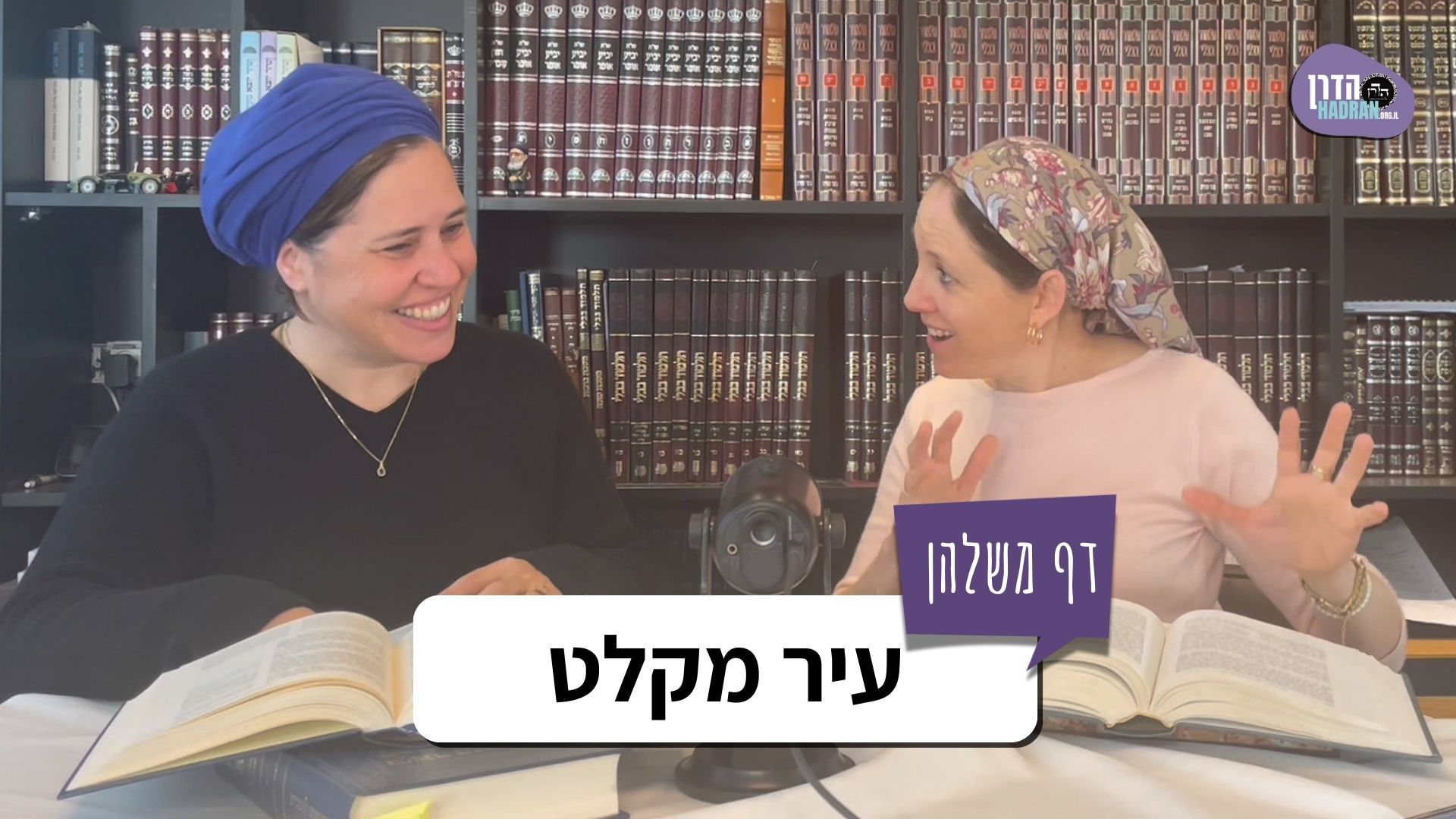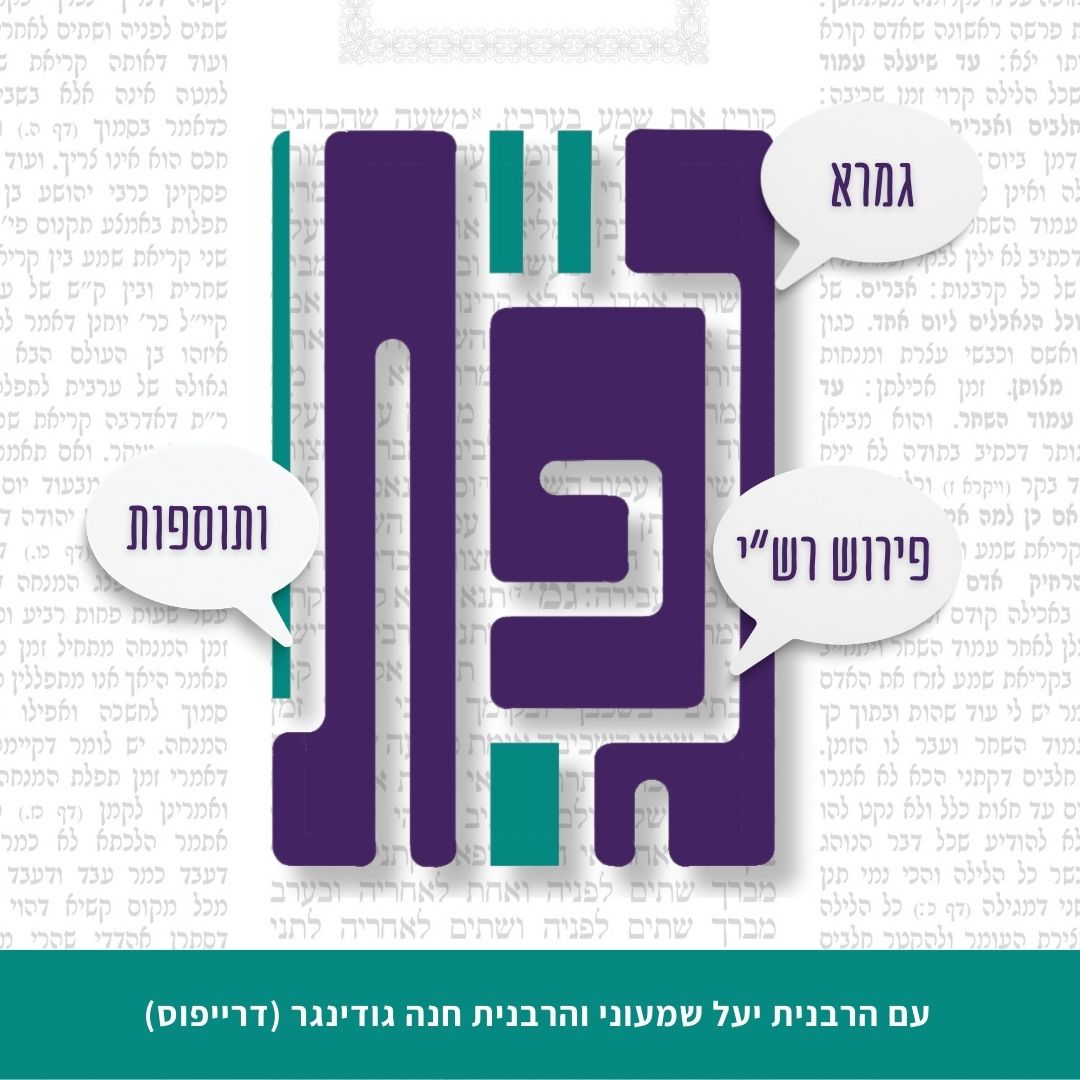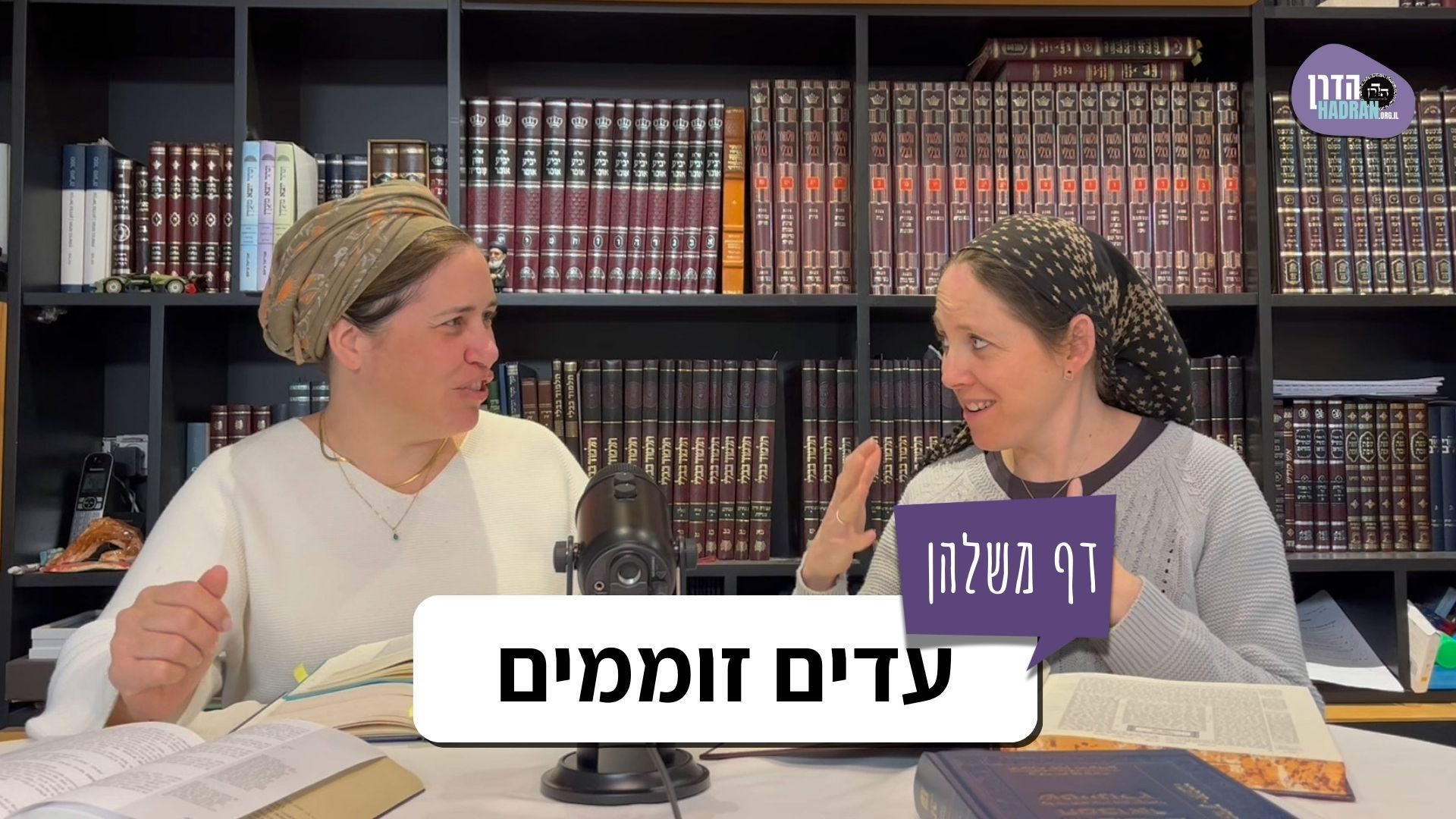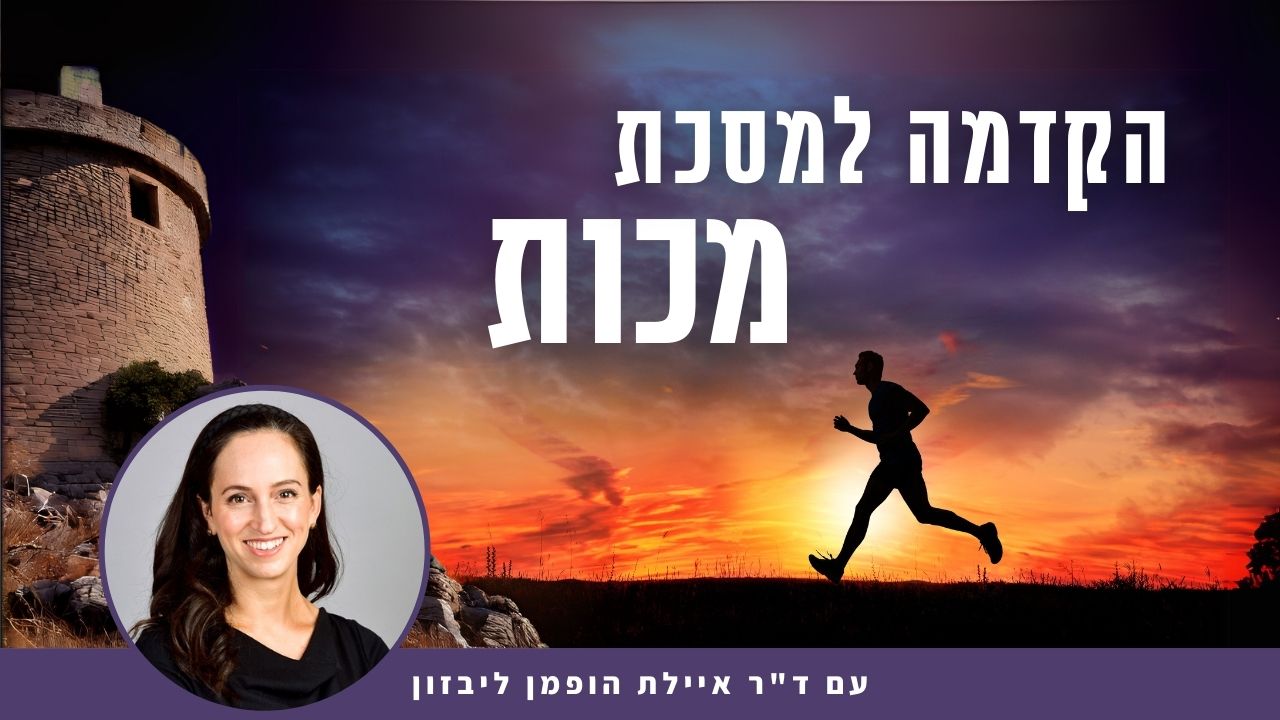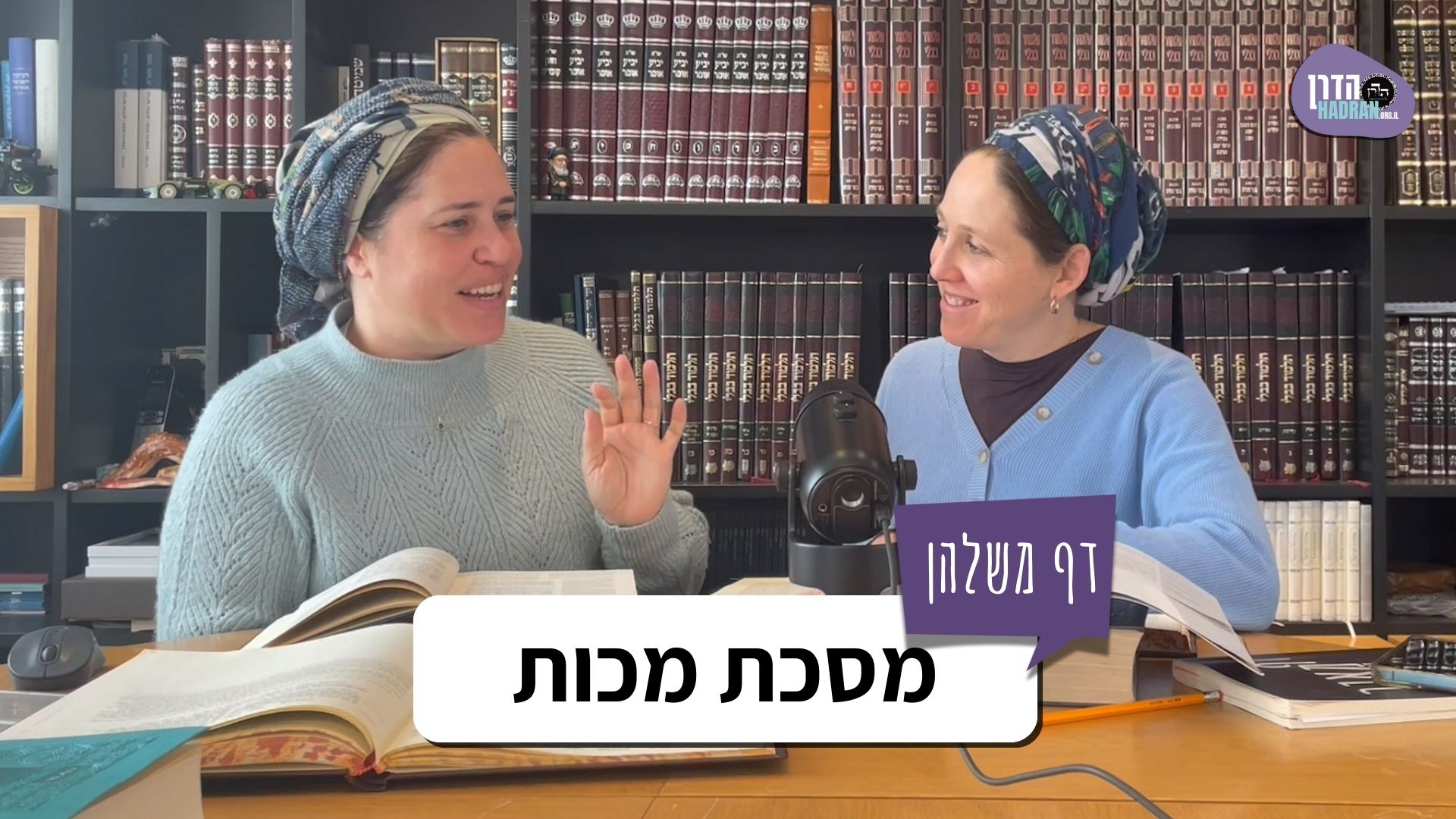הלימוד השבוע מוקדש ע”י נירה פלדמן לע”נ פיי דרק.
רוצה להקדיש שיעור?

הלימוד השבוע מוקדש ע”י נירה פלדמן לע”נ פיי דרק.
העמקה
רוצה להבין מה באמת קורה מתחת לפני השטח של הסוגיה?
שיעורים, פודקאסטים והרחבות של מיטב המורות שלנו יפתחו לך עוד זוויות וכיווני חשיבה.
חדשה בלימוד הגמרא?
זה הדף הראשון שלך? איזו התרגשות עצומה! יש לנו בדיוק את התכנים והכלים שיעזרו לך לעשות את הצעדים הראשונים ללמידה בקצב וברמה שלך, כך תוכלי להרגיש בנוח גם בתוך הסוגיות המורכבות ומאתגרות.
פסיפס הלומדות שלנו
גלי את קהילת הלומדות שלנו, מגוון נשים, רקעים וסיפורים. כולן חלק מתנועה ומסע מרגש ועוצמתי.
מכות יד
כִּדְאָמְרִינַן מֵעִיקָּרָא, שֶׁאִם עָשׂוּ תְּשׁוּבָה – בֵּית דִּין שֶׁל מַעְלָה מוֹחֲלִין לָהֶן. מַאי אָמְרַתְּ? הָא לָא עֲבוּד תְּשׁוּבָה? לָא פְּסִיקָא מִילְּתָא לְכָרֵת.
as we stated initially, that if they repented the heavenly court absolves them of the punishment of karet, and therefore this is not a case of two punishments for one transgression, and there is no exemption from lashes. What do you say in response, that they did not yet repent? Nevertheless, since the matter is not clear-cut with regard to karet, as perhaps they repented, they are therefore not exempt from lashes.
רַבִּי יִצְחָק אוֹמֵר: חַיָּיבֵי כָרֵיתוֹת בַּכְּלָל הָיוּ, וְלָמָּה יָצָאת כָּרֵת בַּאֲחוֹתוֹ – לְדוּנוֹ בְּכָרֵת וְלֹא בְּמַלְקוֹת.
§ It is taught in the baraita that Rabbi Yitzḥak says: Those liable to receive karet in cases of incest were included in the principle: “For anyone who performs any of these abominations, the souls who do so shall be excised from among their people” (Leviticus 18:29). And why was the punishment of karet, when administered to one who engages in intercourse with his sister, excluded from this verse and mentioned independently (Leviticus 20:17)? It is to sentence him to be punished with karet and not to be punished with lashes.
וְרַבָּנַן, כָּרֵת בַּאֲחוֹתוֹ לְמָה לִי? לְחַלֵּק, וְכִדְרַבִּי יוֹחָנָן, דְּאָמַר רַבִּי יוֹחָנָן: שֶׁאִם עֲשָׂאָן כּוּלָּם בְּהֶעְלֵם אֶחָד – חַיָּיב עַל כׇּל אַחַת וְאַחַת.
The Gemara asks: And according to the Rabbis, i.e., Rabbi Yishmael and Rabbi Akiva, who maintain that those liable to receive karet are flogged, why do I need karet to be written in the case of one who engages in intercourse with his sister; what does it teach? The Gemara answers: It teaches to divide the various prohibitions of sexual intercourse with forbidden relatives, and is in accordance with the statement of Rabbi Yoḥanan, as Rabbi Yoḥanan says that if one performed all the transgressions described in the passage in the Torah enumerating forbidden relatives during one lapse of awareness, he is liable to bring a separate sin-offering for each and every one, as one is liable to receive karet for each and every one.
וְרַבִּי יִצְחָק, לְחַלֵּק מְנָא לֵיהּ? נָפְקָא לֵיהּ מִוְּאֶל אִשָּׁה בְּנִדַּת טֻמְאָתָהּ, לְחַיֵּיב עַל כׇּל אִשָּׁה וְאִשָּׁה.
The Gemara asks: And concerning Rabbi Yitzḥak, who derives the halakha that one who is liable to receive karet is not flogged from the fact that karet for one who engages in intercourse with his sister emerged from the generalization, from where does he derive the concept to divide the various prohibitions? The Gemara answers: He derives it from the verse written with regard to a menstruating woman: “And to a woman in the separation of her impurity you shall not approach” (Leviticus 18:19). From the superfluous expression “and to a woman,” Rabbi Yitzḥak derives that one is liable for intercourse with each and every forbidden woman.
וְרַבָּנַן נָמֵי, תִּיפּוֹק לֵיהּ מֵהָא! אִין הָכִי נָמֵי. וְאֶלָּא, כָּרֵת דַּאֲחוֹתוֹ לְמָה לִי? לְחַיְּיבוֹ עַל אֲחוֹתוֹ וְעַל אֲחוֹת אָבִיו וְעַל אֲחוֹת אִמּוֹ.
The Gemara asks: And with regard to the Rabbis as well, let them derive the division of the prohibitions from this verse, rather than from the fact that karet for one who engages in intercourse with his sister emerged from the generalization. The Gemara answers: Yes, it is indeed so, they derive division from the verse with regard to a menstruating woman; but rather, the question again arises: Why do I need karet to be written in the case of one who engages in intercourse with his sister; what does it teach? The Gemara answers: It teaches to render him liable to bring three separate sin-offerings for engaging in intercourse with his sister, and with his father’s sister, and with his mother’s sister, during a single lapse of awareness.
פְּשִׁיטָא, הֲרֵי גּוּפִין מוּחְלָקִין, הֲרֵי שֵׁמוֹת מוּחְלָקִין! אֶלָּא, לְחַיְּיבוֹ עַל אֲחוֹתוֹ שֶׁהִיא אֲחוֹת אָבִיו שֶׁהִיא אֲחוֹת אִמּוֹ. וְהֵיכִי מַשְׁכַּחַתְּ לַהּ – בְּרַשִּׁיעָא בַּר רַשִּׁיעָא.
The Gemara asks: Isn’t the fact that he is liable to bring three sin-offerings obvious? The actions were performed with separate bodies, i.e., three different women, and those actions violated the names of three separate prohibitions; no derivation is required. Rather, it is to render him liable to bring three separate sin-offerings for engaging in intercourse with his sister who is also his father’s sister and who is also his mother’s sister. The Gemara inquires: And how can you find these circumstances? The Gemara answers: It is found in the case of a wicked person, son of a wicked person. How so? If a man engages in intercourse with his mother, and she bears him two daughters, and he then engages in intercourse with one of the daughters and fathers a son, that son could engage in intercourse with the other daughter, who is his half sister through his father, as well as being his father’s half sister and his mother’s half sister.
וְרַבִּי יִצְחָק, הָא מְנָא לֵיהּ? נָפְקָא לֵיהּ מִקַּל וָחוֹמֶר, דְּתַנְיָא: אָמַר רַבִּי עֲקִיבָא: שָׁאַלְתִּי אֶת רַבָּן גַּמְלִיאֵל וְרַבִּי יְהוֹשֻׁעַ בָּאִיטְלִיז שֶׁל עֵימָאוּם, שֶׁהָלְכוּ לִיקַּח בְּהֵמָה לְמִשְׁתֵּה בְנוֹ שֶׁל רַבָּן גַּמְלִיאֵל: הַבָּא עַל אֲחוֹתוֹ שֶׁהִיא אֲחוֹת אָבִיו שֶׁהִיא אֲחוֹת אִמּוֹ, מַהוּ? [אֵינוֹ] חַיָּיב עַל כּוּלָּן אֶלָּא אַחַת, אוֹ חַיָּיב עַל כׇּל אַחַת וְאַחַת?
The Gemara asks: And with regard to Rabbi Yitzḥak, from where does he derive this? He derives it by means of an a fortiori inference, as it is taught in a baraita that Rabbi Akiva says: I asked Rabban Gamliel and Rabbi Yehoshua a question in the meat market [itliz] of the town of Emmaus, where they went to purchase an animal for the wedding feast of Rabban Gamliel’s son. Rabbi Akiva asked: In the case of one who engages in intercourse with his sister who is also his father’s sister and who is also his mother’s sister, what is the halakha with regard to bringing a sin-offering? Is he liable to bring only one sin-offering for engaging in intercourse that violated all of the prohibitions, or is he liable to bring a sin-offering for each and every prohibition that he violated when he engaged in intercourse with that woman?
אָמְרוּ לוֹ: זוֹ לֹא שָׁמַעְנוּ, אֲבָל שָׁמַעְנוּ: הַבָּא עַל חָמֵשׁ נָשִׁים נִדּוֹת בְּהֶעְלֵם אֶחָד, שֶׁחַיָּיב עַל כׇּל אַחַת וְאַחַת, וְנִרְאִין דְּבָרִים מִקַּל וָחוֹמֶר: וּמָה נִדָּה שֶׁהִיא שֵׁם אֶחָד – חַיָּיב עַל כׇּל אַחַת וְאַחַת, כָּאן שֶׁשְּׁלֹשָׁה שֵׁמוֹת – לֹא כׇּל שֶׁכֵּן?
Rabban Gamliel and Rabbi Yehoshua said to him: We did not hear the halakha in that case. But we heard the halakha in a similar case: One who engages in intercourse with five menstruating women during one lapse of awareness is liable to bring a sin-offering for each and every one of the women with whom he engaged in intercourse, and it appears with regard to the matter of your inquiry that he is liable to bring a sin-offering for each and every prohibition, by means of an a fortiori inference. How so? If in the case of a menstruating woman, which involves violation of the name of one prohibition, he is liable for intercourse with each and every one, here, where the woman is forbidden due to the names of three prohibitions, is it not all the more so logical that he is liable to bring three sin-offerings?
וְאִידָּךְ, קַל וָחוֹמֶר פְּרִיכָא הוּא: מָה לְנִדָּה, שֶׁכֵּן גּוּפִין מוּחְלָקִין.
The Gemara explains: And according to the other opinion of the Rabbis, who maintain that liability for intercourse with each and every one is derived from an explicit verse, it is a refuted a fortiori inference: What is notable about the case of a menstruating woman? It is notable in that the actions were performed with separate bodies, i.e., different women, while in the case in question, the person engaged in intercourse with one woman.
וּלְאִידַּךְ נָמֵי, הַאי וַדַּאי קַל וָחוֹמֶר פְּרִיכָא הוּא! אֶלָּא, נָפְקָא לֵיהּ מֵ״אֲחֹתוֹ״ דְּסֵיפָא.
The Gemara asks: And according to the other opinion of Rabbi Yitzḥak too, this is certainly a refuted a fortiori inference, from which no halakha can be derived. Rather, as for the halakha that a person is liable to bring three sin-offerings for engaging in intercourse with his sister who is also his father’s sister and who is also his mother’s sister, Rabbi Yitzḥak derives it from the phrase “his sister” written in the latter clause of that verse. The verse begins: “And a man who takes his sister, the daughter of his father or the daughter of his mother…and they shall be excised…the nakedness of his sister he has revealed, he shall bear his transgression” (Leviticus 20:17). From the repetition of the term sister, it is derived that he is liable to bring a sin-offering for each and every prohibition that he violated.
וְאִידָּךְ, ״אֲחוֹתוֹ״ דְּסֵיפָא לְמָה לִי? לְחַיְּיבוֹ עַל אֲחוֹתוֹ בַּת אָבִיו וּבַת אִמּוֹ, לוֹמַר שֶׁאֵין עוֹנְשִׁין מִן הַדִּין.
The Gemara asks: And according to the other opinion of the Rabbis, who derive this halakha from the term “sister” at the beginning of the verse, why do I need the phrase “his sister” to be written in the latter clause of that verse; what does it teach? The Gemara answers: It teaches to render him liable for engaging in intercourse with his sister who is also the daughter of his father and the daughter of his mother, which comes to say that one does not administer punishment based on an a fortiori inference. Although the Torah specified liability for one who engaged in intercourse with his paternal sister and for one who engaged in intercourse with his maternal sister, an independent derivation is necessary for liability for one who engaged in intercourse with a woman who is both his paternal and his maternal sister.
וְאִידַּךְ? אִיבָּעֵית אֵימָא גָּמַר עוֹנֶשׁ מֵאַזְהָרָה. וְאִיבָּעֵית אֵימָא, נָפְקָא לֵיהּ
The Gemara asks: And according to the other opinion of Rabbi Yitzḥak, who derives another matter from the term “sister” in the latter verse, from where does he derive liability for one who engaged in intercourse with a woman who is both his paternal and his maternal sister? The Gemara answers: If you wish, say he derives the punishment from the prohibition; just as the prohibition includes intercourse with a woman who is both his paternal and his maternal sister, the same applies to the punishment. And if you wish, say instead that he derives it
מֵ״אֲחוֹתוֹ״ דְּרֵישָׁא.
from the term “his sister” at the beginning of the verse (Leviticus 20:17), as the verse could have been formulated: And a man who takes the daughter of his father or the daughter of his mother, and there is no need to mention a sister at all. Liability for intercourse with a woman who is the daughter of both his father and his mother is derived from the term “his sister.”
וְאִידַּךְ: הַהוּא מִיבְּעֵי לֵיהּ, לְחַלֵּק כָּרֵת לַמְפַטֵּם וְלַסָּךְ.
And according to the other opinion of the Rabbis, since nothing relevant to the topic of intercourse with one’s sister is derived from the term “sister,” that term is necessary in order to derive an unrelated matter, i.e., to divide the various prohibitions and establish liability for either one who blends anointing oil or for one who applies anointing oil to receive karet, if he performed either intentionally, and to bring a sin-offering if he performed either unwittingly, even though only a single punishment of karet is written in the verse: “A man who blends a mixture like it and who places any of it upon a non-priest, and he shall be excised from his people” (Exodus 30:33).
וְאִידַּךְ? סָבַר כְּרַבִּי אֶלְעָזָר אָמַר רַבִּי הוֹשַׁעְיָא, דְּאָמַר רַבִּי אֶלְעָזָר אָמַר רַבִּי הוֹשַׁעְיָא: כׇּל מָקוֹם שֶׁאַתָּה מוֹצֵא שְׁנֵי לָאוִין וְכָרֵת אֶחָד – חֲלוּקִין הֵן לְקׇרְבָּן.
And the other, Rabbi Yitzḥak, holds in this regard in accordance with that which Rabbi Elazar says that Rabbi Hoshaya says, as Rabbi Elazar says that Rabbi Hoshaya says that there is a principle: Any place where you find two different prohibitions and one punishment of karet stated concerning them, they are distinct with regard to liability to bring an offering; if he performed both unwittingly, he is liable to bring two sin-offerings. According to Rabbi Yitzḥak, there is no need for an additional derivation to render one who unwittingly blends and applies anointing oil liable to bring two sin-offerings.
וְאִי בָּעֵית אֵימָא: לָא סָבַר לַהּ כְּרַבִּי אֶלְעָזָר, וְנָפְקָא לֵיהּ מִ״וְאִישׁ אֲשֶׁר יִשְׁכַּב אֶת אִשָּׁה דָּוָה״.
And if you wish, say instead that he does not hold in accordance with that which Rabbi Elazar says that Rabbi Hoshaya says in this regard, and he derives liability to bring two sin-offerings for one who unwittingly blends and applies anointing oil from a superfluous term elsewhere: “And a man who lies with a woman who is afflicted, and…both of them shall be excised” (Leviticus 20:18). Intercourse with a menstruating woman is already included in the verse: “For anyone who performs any of these abominations, the souls who do so shall be excised from among their people” (Leviticus 18:29). Since this verse does not introduce any nuance concerning the punishment of karet for one who engages in intercourse with a menstruating woman, an unrelated matter is derived, which establishes liability for one who blends anointing oil and for one who applies anointing oil to receive karet if he performed either act intentionally, and to bring a sin-offering if he performed either act unwittingly.
וְאִידַּךְ? הַהוּא מִיבְּעֵי לֵיהּ לְכִדְרַבִּי יוֹחָנָן, דְּאָמַר רַבִּי יוֹחָנָן מִשּׁוּם רַבִּי שִׁמְעוֹן בֶּן יוֹחַי: מִנַּיִן שֶׁאֵין הָאִשָּׁה טְמֵאָה עַד שֶׁיֵּצֵא מַדְוֶהָ דֶּרֶךְ עֶרְוָתָהּ? שֶׁנֶּאֱמַר: ״וְאִישׁ אֲשֶׁר יִשְׁכַּב אֶת אִשָּׁה דָּוָה וְגִלָּה אֶת עֶרְוָתָהּ וְגוֹ׳״ – מְלַמֵּד שֶׁאֵין הָאִשָּׁה טְמֵאָה עַד שֶׁיֵּצֵא מַדְוֶהָ דֶּרֶךְ עֶרְוָתָהּ.
And according to the other opinion of the Rabbis, what is derived from the verse? That verse is necessary for him to derive the halakha in accordance with the statement of Rabbi Yoḥanan, as Rabbi Yoḥanan says in the name of Rabbi Shimon ben Yoḥai: From where is it derived that a woman is impure as a menstruating woman only if the blood of menstruation is discharged through her vagina? Blood discharged from any other orifice does not render her impure. It is derived as it is stated: “And a man who lies with a woman who is afflicted, and uncovers her nakedness” (Leviticus 20:18), which teaches that a woman is impure only if the blood of menstruation is discharged through her vagina.
״וְטָמֵא שֶׁאָכַל אֶת הַקֹּדֶשׁ״. בִּשְׁלָמָא הַבָּא לַמִּקְדָּשׁ טָמֵא – כְּתִיב עוֹנֶשׁ וּכְתִיב אַזְהָרָה: עוֹנֶשׁ – דִּכְתִיב: ״אֶת מִשְׁכַּן ה׳ טִמֵּא וְנִכְרְתָה״. אַזְהָרָה – ״וְלֹא יְטַמְּאוּ אֶת מַחֲנֵיהֶם״. אֶלָּא טָמֵא שֶׁאָכַל אֶת הַקֹּדֶשׁ, בִּשְׁלָמָא ״עוֹנֶשׁ״ כְּתִיב – ״וְהַנֶּפֶשׁ אֲשֶׁר תֹּאכַל בָּשָׂר מִזֶּבַח הַשְּׁלָמִים אֲשֶׁר לַה׳ וְטֻמְאָתוֹ עָלָיו וְנִכְרְתָה״, אֶלָּא אַזְהָרָה מִנַּיִן?
§ The mishna teaches: And a ritually impure person who ate sacrificial food, and one who entered the Temple while ritually impure, are flogged. The Gemara asks: Granted, one who entered the Temple while ritually impure is flogged, as a punishment is written and a prohibition is written. The Gemara elaborates: There is a punishment, as it is written: “He has rendered impure the Tabernacle of the Lord, and that soul shall be excised” (Numbers 19:13). And there is a prohibition, as it is written: “And they shall not render their camp impure” (Numbers 5:3). But with regard to a ritually impure person who ate sacrificial food, granted, a punishment is written: “And the soul that eats from the flesh of a peace-offering that pertains to the Lord and his impurity is upon him, and that soul shall be excised” (Leviticus 7:20). But from where is a prohibition derived?
רֵישׁ לָקִישׁ אוֹמֵר: ״בְּכׇל קֹדֶשׁ לֹא תִגָּע״.
Reish Lakish says: The prohibition is derived from that which is written with regard to a woman after childbirth who has not yet completed the purification process: “No consecrated item shall she touch” (Leviticus 12:4), and the reference is not merely to touching, but to eating.
רַבִּי יוֹחָנָן אוֹמֵר, תָּנֵי בַּרְדְּלָא: אָתְיָא ״טוּמְאָתוֹ״ ״טוּמְאָתוֹ״, כְּתִיב הָכָא ״וְטֻמְאָתוֹ עָלָיו וְנִכְרְתָה״, וּכְתִיב הָתָם ״טָמֵא יִהְיֶה עוֹד טֻמְאָתוֹ בּוֹ״, מָה לְהַלָּן עוֹנֶשׁ וְאַזְהָרָה – אַף כָּאן עוֹנֶשׁ וְאַזְהָרָה.
Rabbi Yoḥanan says that a Sage named Bardela teaches: The matter is derived by means of a verbal analogy between the term “his impurity” written here, and the term “his impurity” written there. Here, with regard to a ritually impure person who eats sacrificial food, it is written: “And his impurity is upon him, and that soul shall be excised,” and there, with regard to a ritually impure person entering the Temple, it is written: “He shall be impure, his impurity is yet upon him” (Numbers 19:13). Just as there, with regard to a ritually impure person who entered the Sanctuary, there is a punishment and there is a prohibition, as noted earlier, so too here, with regard to a ritually impure person who ate sacrificial food, it is derived that there is a punishment and there is a prohibition.
בִּשְׁלָמָא, רֵישׁ לָקִישׁ לָא אָמַר כְּרַבִּי יוֹחָנָן – גְּזֵירָה שָׁוָה לָא גְּמִיר. אֶלָּא רַבִּי יוֹחָנָן, מַאי טַעְמָא לָא אָמַר כְּרֵישׁ לָקִישׁ? אָמַר לָךְ: הַהוּא אַזְהָרָה לִתְרוּמָה.
The Gemara analyzes the dispute: Granted, Reish Lakish did not say that the source for the prohibition is a verbal analogy in accordance with the opinion of Rabbi Yoḥanan, as he did not receive this verbal analogy as a tradition from his teachers and one may not derive a verbal analogy on his own. But what is the reason that Rabbi Yoḥanan did not say that the source of the prohibition is the verse “No consecrated item shall she touch,” in accordance with the opinion of Reish Lakish, as that appears to be a more straightforward source? The Gemara answers: Rabbi Yoḥanan could say to you: That is not a prohibition for partaking of sacrificial food in a state of impurity; rather, it is a prohibition for partaking of teruma in a state of impurity.
וְרֵישׁ לָקִישׁ, אַזְהָרָה לִתְרוּמָה מְנָא לֵיהּ? נָפְקָא לֵיהּ מֵ״אִישׁ אִישׁ מִזֶּרַע אַהֲרֹן וְהוּא צָרוּעַ אוֹ זָב״, אֵי זֶהוּ דָּבָר שֶׁהוּא שָׁוֶה בְּזַרְעוֹ שֶׁל אַהֲרֹן – הֱוֵי אוֹמֵר זוֹ תְּרוּמָה. וְאִידַּךְ? הַהוּא לַאֲכִילָה, וְהָא לִנְגִיעָה.
The Gemara asks: And Reish Lakish, from where does he derive a prohibition against partaking of teruma in a state of impurity? The Gemara answers: He derives it from that which is written: “Any man from the descendants of Aaron who is leprous or a zav may not partake of the sacred food until he will be pure” (Leviticus 22:4). The phrase “descendants of Aaron” indicates that the prohibition applies to all descendants, including women. What, then, is an item whose status is equal with regard to all descendants of Aaron, as opposed to certain sacrificial foods that may be eaten only by males? You must say it is teruma. The Gemara asks: And according to the other opinion of Rabbi Yoḥanan, what is derived from this verse? The Gemara answers: This verse serves to prohibit partaking of teruma while impure; and that verse: “No consecrated item shall she touch,” serves to prohibit touching teruma while impure.
וְרֵישׁ לָקִישׁ, הַאי ״בְּכׇל קֹדֶשׁ לֹא תִגָּע״ לְהָכִי הוּא דַּאֲתָא? הַהוּא מִיבְּעֵי לֵיהּ לְטָמֵא שֶׁנָּגַע בַּקֹּדֶשׁ! דְּאִיתְּמַר: טָמֵא שֶׁנָּגַע בַּקֹּדֶשׁ, רֵישׁ לָקִישׁ אוֹמֵר: לוֹקֶה, רַבִּי יוֹחָנָן אוֹמֵר: אֵינוֹ לוֹקֶה. רֵישׁ לָקִישׁ אוֹמֵר: לוֹקֶה, ״בְּכׇל קֹדֶשׁ לֹא תִגָּע״. רַבִּי יוֹחָנָן אוֹמֵר: אֵין לוֹקֶה, הָהוּא אַזְהָרָה לִתְרוּמָה הוּא דַּאֲתָא!
The Gemara asks: And according to Reish Lakish, does this verse: “No consecrated item shall she touch” (Leviticus 12:4), come to teach this prohibition concerning partaking of sacrificial food? He requires that verse in order to derive the prohibition of a ritually impure person who touched sacrificial food. As it was stated that there is an amoraic dispute with regard to a ritually impure person who touched sacrificial food. Reish Lakish says: He is flogged. Rabbi Yoḥanan says: He is not flogged. The Gemara elaborates: Reish Lakish says: He is flogged, as it is written: “No consecrated item shall she touch.” Rabbi Yoḥanan says: He is not flogged, because it is to teach a prohibition for touching teruma that this verse comes.
טָמֵא שֶׁנָּגַע בַּקֹּדֶשׁ – מִדְּאַפְּקֵיהּ רַחֲמָנָא בִּלְשׁוֹן נְגִיעָה, אַזְהָרָה לָאוֹכֵל – אִתַּקַּושׁ קֹדֶשׁ לְמִקְדָּשׁ.
The Gemara answers: Reish Lakish derives both prohibitions from this verse. The prohibition concerning a ritually impure person who touched sacrificial food is derived from the fact that the Merciful One formulates the prohibition with the term touching. The prohibition for a ritually impure person who partakes of sacrificial food is derived because the matter of a ritually impure person eating sacrificial food is juxtaposed to the matter of entering the Temple while ritually impure, as the Gemara explains below.
וְאַכַּתִּי, לְהָכִי הוּא דַּאֲתָא? הַהוּא מִיבְּעֵי לֵיהּ לְטָמֵא שֶׁאָכַל בְּשַׂר קֹדֶשׁ לִפְנֵי זְרִיקַת דָּמִים! דְּאִיתְּמַר: טָמֵא שֶׁאָכַל בְּשַׂר קֹדֶשׁ לִפְנֵי זְרִיקַת דָּמִים, רֵישׁ לָקִישׁ אוֹמֵר: לוֹקֶה, רַבִּי יוֹחָנָן אוֹמֵר: אֵינוֹ לוֹקֶה.
The Gemara asks: And still, does the verse come for that derivation? Reish Lakish requires that verse in order to derive the prohibition for a ritually impure person who ate sacrificial meat before the sprinkling of the blood of the offering on the altar, when it is not permitted to partake of the meat. As it was stated, there is an amoraic dispute with regard to a ritually impure person who ate sacrificial meat before the sprinkling of the blood. Reish Lakish says: He is flogged for doing so; Rabbi Yoḥanan says: He is not flogged.
רֵישׁ לָקִישׁ אוֹמֵר: לוֹקֶה, ״בְּכׇל קֹדֶשׁ לֹא תִגָּע״, לָא שְׁנָא לִפְנֵי זְרִיקָה וְלָא שְׁנָא לְאַחַר זְרִיקָה. רַבִּי יוֹחָנָן אוֹמֵר: אֵינוֹ לוֹקֶה. רַבִּי יוֹחָנָן לְטַעְמֵיהּ, דְּאָמַר קְרָא ״טוּמְאָתוֹ״ ״טוּמְאָתוֹ״, וְכִי כְּתִיב ״טוּמְאָתוֹ״ – לְאַחַר זְרִיקָה הוּא דִּכְתִיב! הָהִיא מִ״בְּכׇל קֹדֶשׁ״ נָפְקָא.
Reish Lakish says: He is flogged, as it is written: “No consecrated item shall she touch,” which is stated in general terms, indicating that it is no different whether one touches the consecrated item prior to sprinkling the blood, and it is no different if one touches the consecrated item after sprinkling the blood. Rabbi Yoḥanan says: He is not flogged. Rabbi Yoḥanan conforms to his standard line of reasoning, that the prohibition is derived by means of the verbal analogy cited above, as the verse states “his impurity,” written with regard to a ritually impure person who eats sacrificial food, and the meaning of that term is derived from “his impurity,” written with regard to a ritually impure person entering the Temple. And when “his impurity” is written, it is with regard to partaking of sacrificial meat after the sprinkling of the blood that it is written. The Gemara explains that according to Reish Lakish, that prohibition is derived from the term: “No [bekhol] consecrated item,” as the term bekhol is inclusive and prohibits one from partaking of sacrificial meat even before the sprinkling of the blood.
תַּנְיָא כְּווֹתֵיהּ דְּרֵישׁ לָקִישׁ: ״בְּכׇל קֹדֶשׁ לֹא תִגָּע״ – אַזְהָרָה לָאוֹכֵל. אַתָּה אוֹמֵר אַזְהָרָה לָאוֹכֵל, אוֹ אֵינוֹ אֶלָּא אַזְהָרָה לַנּוֹגֵעַ? תַּלְמוּד לוֹמַר: בְּכׇל קֹדֶשׁ לֹא תִגָּע וְאֶל הַמִּקְדָּשׁ וְגוֹ׳״ – מַקִּישׁ קֹדֶשׁ לַמִּקְדָּשׁ, מָה מִקְדָּשׁ דָּבָר שֶׁיֵּשׁ בּוֹ נְטִילַת נְשָׁמָה – אַף כׇּל דָּבָר שֶׁיֵּשׁ בּוֹ נְטִילַת נְשָׁמָה. וְאִי בִּנְגִיעָה – מִי אִיכָּא נְטִילַת נְשָׁמָה? אֶלָּא בַּאֲכִילָה.
The Gemara comments: It is taught in a baraita in accordance with the opinion of Reish Lakish. It is written: “No consecrated item shall she touch”; this is a prohibition for a ritually impure person who eats sacrificial food. Do you say that it is a prohibition for a ritually impure person who eats sacrificial food, or perhaps it is only a prohibition for a ritually impure person who touches sacrificial food? The verse states: “No consecrated item shall she touch, and to the Temple she may not come” (Leviticus 12:4). The verse juxtaposes the matter of a ritually impure person eating sacrificial food to the matter of entering the Temple while ritually impure. Just as entering the Temple is a matter that entails a punishment that involves the taking of a life, i.e., karet, so too, every matter in that verse entails a punishment that involves the taking of a life. The Gemara explains: And if the prohibition is with regard to touching sacrificial food, is there a punishment that entails the taking of a life? Rather, the prohibition is with regard to eating.
אָמַר רַבָּה בַּר בַּר חָנָה אָמַר רַבִּי יוֹחָנָן: כׇּל לֹא תַעֲשֶׂה שֶׁקְּדָמוֹ עֲשֵׂה – לוֹקִין עָלָיו.
§ Rabba bar bar Ḥana says that Rabbi Yoḥanan says: With regard to any prohibition that has a positive mitzva that preceded it, everyone agrees that one is flogged for its violation, as it is not classified as a prohibition that entails fulfillment of a positive mitzva.

